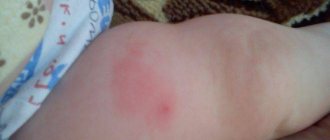Temperature during vaccinations
Vaccination is the introduction into the body of killed or greatly weakened microorganisms that contribute to the development of immunity to a specific disease. The formation of immunity is accompanied by various reactions, one of which is a rise in body temperature (the so-called regulatory temperature).
Hyperthermia can have the following causes:
- Release of pyrogenic substances during the destruction of the vaccination antigen.
- Individual characteristics of the body with a tendency to develop temperature reactions.
- Low degree of purification of the vaccine, its type.
- Active functioning of the immune system.
Severe consequences of vaccination occur quite rarely, and mild manifestations of vaccination reactions quickly disappear and do not cause severe discomfort. In most cases, healthy children with no contraindications tolerate vaccinations quite well. In addition, the younger the child’s age, the lower the likelihood of fever.
Vaccination is a necessity that reduces or eliminates the development of serious diseases, as well as preventing the development of epidemics. To minimize side effects, you should consult your doctor.
If there is no temperature at all
It also happens that after the vaccine is administered to the child’s body, no reaction occurs:
- The baby did not have a fever;
- There was no redness at the injection site;
- The skin area heals instantly.
Many parents, seeing such a reaction, calm down, but in vain. This is not at all as good as they think: experts can confirm that immunity from tuberculosis has not been developed. It is imperative to consult a doctor for qualified advice.
It is unlikely that you will be vaccinated again, but you will be given recommendations against tuberculosis infection. Most likely, the baby will now be vaccinated again only at the age of seven. Also, the absence of temperature may indicate that the vaccination was administered incorrectly, for example, contraindications and characteristics of the child’s body were not taken into account. It happens that the temperature rises not because of the vaccination, but as a result of certain psychosomatic reactions of the child.

Why is BCG necessary?
BCG does not exclude infection with tuberculosis, but helps protect the child from the development of its severe forms (such as meningitis, miliary tuberculosis, bone tuberculosis and other pathologies with a possible fatal outcome). It is also a preventative measure that reduces the number of other complications of the disease.
Early immunization contributes to a more pronounced result, which is why vaccination is usually done in the maternity hospital. In our country, vaccination is carried out with BCG and BCG-M (for gentle immunization). For administration, the intradermal method is used. The injection is made along the outer area of the left shoulder. It takes about a year to develop immunity, with full immunity developing in 85% of children. The effect of the drug lasts from 5 to 7 years.
It is necessary to vaccinate with BCG:
- newborns during the first 6 weeks of life, especially those living in areas with a high incidence of tuberculosis;
- children with a weak BCG reaction;
- for revaccination of children 7 and 14 years old.
Revaccination is not necessary for regions where there is a low incidence rate, and is necessary in case of direct contact with a tuberculosis patient. It is carried out within three days to two weeks after a negative reaction to tuberculin.
The BCG vaccine is not effective if a tuberculosis infection is already present in the body and in this case can cause various complications, so performing the Mantoux test is a mandatory precaution before vaccinating children older than six weeks.
Cough after vaccination
In most cases, coughing is not a reaction to the vaccine. In any case, specifically for BCG, this is not the norm. But there is no need to panic. In general, a child coughs a little more often than an adult.
You should only consult a doctor in a few cases:
- High fever for several days.
- Runny nose and other cold symptoms.
- The cough does not go away for a long time and gets worse.
You should not self-medicate, since it is unknown how the body will react to the drugs that you, and not the doctor, prescribe. In any case, specialist advice is required.
Coughing is not a normal reaction of the body to vaccination against tuberculosis. But there is no need to panic, perhaps it is a cold due to a weakened immune system.
Preparation and contraindications
During primary vaccination in the maternity hospital, the newborn does not undergo any additional examinations requiring blood sampling directly on the day of vaccination. Parenteral administration of drugs (in the form of injections) is excluded.
For older children, it is possible to prescribe antihistamines and antipyretics in case of existing health problems. In other cases, taking medications is not advisable. You should also not change your child’s diet before vaccination to avoid false allergic reactions to the vaccine.
There are permanent and temporary contraindications to BCG.
The permanent ones include:
- primary immunodeficiencies and HIV;
- malignant diseases;
- pathologies of the nervous system;
- tuberculosis infection.
To temporary:
- prematurity less than 2500 g;
- purulent-septic skin diseases in the area of BCG placement;
- hemolytic disease;
- VUI;
- ARVI, periods of exacerbation of chronic diseases;
- the presence of generalized BCG infection in family members.
For revaccination, contraindications also include: complications that arose during the previous administration of the vaccine, radiation therapy, taking immunosuppressants, and a positive or questionable result of the Mantoux test.
Before vaccination, an examination by a doctor is required, including thermometry and, if necessary, blood and urine tests. The child must be healthy. BCG vaccination is not given if there is an elevated temperature, manifestations of a respiratory infection or other abnormalities. If there are temporary reasons that interfere with vaccination, vaccination is postponed until they disappear. In case of permanent contraindications, BZH is never performed.
Is a child contagious after vaccination?
Even though the vaccine makes it easier to transmit the disease, there is still a danger of getting infected. True, this is dangerous only for people with weak immunity.
Here are the main risk groups:
- Cancer patients.
- Patients with AIDS.
- Pregnant and lactating women.
- Patients after operations and serious illnesses.
For such people, the danger of getting sick from a vaccinated child remains, but it is still very small. It is important to understand that weak immunity can miss even weakened microorganisms. Therefore, despite the low probability of infection, risk groups need to limit contact with children.
After a child has been vaccinated against tuberculosis, he is unlikely to infect others, but for those who are at risk, it is still better not to contact the vaccinated baby for a while.
Normal healing
To avoid unfounded concern, as well as to take the necessary measures in a timely manner if deviations occur, you need to understand which post-vaccination reactions are normal. The healing process lasts on average up to 5 months and takes place in several stages.
- The formation of a whitish tubercle 5-10 mm in size, which appears immediately after grafting and completely disappears within 20 minutes. There may be slight redness with a bluish tint in the injection area. The swelling, which can last about three days, should not cause alarm.
- The formation of a papule filled with light yellow, and in some cases red, liquid. The appearance of an abscess in newborns occurs at 6-8 weeks, in those who are vaccinated again - after a week, which is the body’s immune response. The lack of such education is also a variant of the norm.
- After 3-4 months, the abscess dries out, sometimes bursts with the release of its contents, and then becomes covered with a scab. The crust may fall off several times, but then form again.
- The appearance of a reddish spot and a scar of 2-10 mm.
Healing is often accompanied by itching, sometimes a feeling of movement in the papule, but pressure and intense rubbing of the injection site should be avoided.
The process of maturation of the abscess should not be accompanied by pain, extensive hyperemia and swelling of more than 2.5 cm, or extension to the shoulder with a significant increase in temperature. The occurrence of such symptoms is a direct indication for seeking medical help.
The formation of immunity takes about two months. At this time, the baby is susceptible to infection, just like an unvaccinated one.
In 5-10% of children, primary vaccination does not result in the appearance of a visible trace of the injection, which indicates an insufficiently developed immunity to tuberculosis infection. In this case, a Mantoux test is performed, and if the result is negative, re-immunization is performed.
The child fell ill after vaccination
Any vaccine, of course, weakens the immune system for some time. Almost all vaccinations can cause certain complications. But in most cases they occur due to non-compliance with simple vaccination rules. For example, if you vaccinate against polio when your child has loose stools, there is a risk of getting polio.
To prevent your baby from getting sick after vaccination, you need to:
- dress it according to the weather;
- do not overfeed the child against his will;
- prepare properly for the vaccine and check your health status.
A cold may not be related to the vaccine, but in any case, at the first symptoms of the disease, you should consult a doctor for advice. In any case, it is necessary to carefully monitor the doctor’s indications regarding behavior after vaccination.
Sometimes parents themselves provoke colds after vaccination. Colds are not more severe due to vaccinations, since the vaccine only affects certain types of cells.
Post-vaccination observation and temperature during BCG
Caring for a child after BCG vaccination is simple, but requires compliance with some rules:
- The vaccination site should be protected from mechanical influences. The papule and wound should not be rubbed, scratched or steamed. An attempt to squeeze out an abscess or tear off a crust that has formed can negatively affect the formation of immunity and lead to infection.
- It is forbidden to use antiseptics (brilliant, iodine, other disinfectants), ointments and creams for treatment, cover the wound with a plaster and apply bandages. It is better to remove discharge, if any, with a sterile cloth.
- The ingress of water is not dangerous, therefore, if the child does not have a temperature after vaccination with BCG, it can be washed. It is better to bathe newborns in boiled water after treating the bath with potassium permanganate or an antiseptic.
- It is advisable to iron the baby’s clothes on both sides until completely healed. It should be put on carefully, avoiding injury to the wound.
- You should not change the diet of the child or mother while breastfeeding.
- There are no restrictions on walks, but it is important to remember that after vaccination the child has an increased susceptibility to viruses and infections. During this period (as well as a week before vaccination), it is necessary to avoid large crowds of people and prevent contact with patients to avoid infection.
Parents are often concerned about the question: is there a fever after BCG vaccination? As a rule, the administration of the vaccine is not accompanied by hyperthermia, but in some cases this is possible. The norm is a slight increase in temperature in an infant - up to 37.5 degrees on the first day after vaccination or when an abscess forms.
In older children, as well as with repeated vaccination at 7 and 14 years of age, a rise in temperature is a negative reaction of the body, which is considered a deviation and requires consultation with a specialist.
Helping a child with hyperthermia
At temperatures up to 38 degrees, antipyretic drugs are used only in children who have a tendency to febrile convulsions. In this case, for infants, rectal suppositories, syrups and solutions are used in accordance with the age dosage.
Drugs of choice: at temperatures up to 38 degrees - containing paracetamol, above 38 - Ibuprofen.
It is forbidden to use Aspirin to reduce fever. When fever occurs in children, it causes such a dangerous complication as Reye's syndrome, which affects the liver and brain. You cannot use the method of wiping with vodka or vinegar. The baby may suffer severe poisoning and skin burns.
Until the condition normalizes, you should avoid vaccinations and bathing.
You should not insist on your child eating, but you should offer him something to drink more often. The famous pediatrician Komarovsky recommends using a raisin decoction as a drink for children in the first year of life, and after a year - a compote of dried fruits, and the temperature of the drink should correspond to body temperature (plus or minus five degrees).
The basic rule for hyperthermia: cool air, but fairly warm clothes, so the child needs to sleep in a well-ventilated room with an optimal air temperature of 18-20 degrees.
If the temperature cannot be brought down, it begins to rise quickly, and the baby’s condition worsens - it is better to call emergency help. If the threshold of 38 degrees is exceeded for more than two days, accompanied by convulsions or loss of consciousness, as well as redness of the injection site, the child must be urgently shown to a doctor.
Temperature readings after tuberculosis vaccine
After BCG vaccination, the temperature rarely rises above 38 degrees. It often lasts for several hours, then gradually decreases without the use of antipyretic medications. Some children may experience a temperature reaction for 2-3 days. This phenomenon is associated with the body’s individual response to the vaccine. The same as temperature jumps after BCG within 37-38 degrees (low-grade fever).

The thermometer's mercury column may reach 38-38.5 closer to night. This temperature after BCG vaccination is a sign of the onset of the disease, provoked by the virus and coinciding with the moment of vaccination. To prevent the child’s condition from worsening, you should consult a doctor. It will also be needed if the temperature from the tuberculosis vaccination lasts longer than three days.
What symptoms should you see a doctor for?
If you experience signs of side effects from BCG, you should consult a doctor. Allergic manifestations in the form of anaphylaxis, angioedema, Stevens-Johnson and Lyell syndromes are especially dangerous.

Do not hesitate to call an ambulance if your baby has a high fever and seizures.
The following symptoms should alert you:
- loss of consciousness;
- anorexia;
- tachycardia;
- dyspnea;
- severe redness of the skin in the puncture area and increased local temperature;
- formation of subcutaneous infiltrate.
In general, adverse reactions after the BCG vaccine are rare, and the effectiveness of immunization reaches 85%.
Local reactions
Local reactions at the vaccination site belong to group 1 according to the WHO classification. Cold abscess is a common complication that develops after intramuscular or subcutaneous vaccine injection. Changes develop 3-6 weeks after manipulation. Initially, it forms a thickening of tissue (infiltrate), which softens over time (this means that the wound has festered). Then one or more fistulas (tubules) are formed, through which the contents of the abscess flow out, leaving an ulcer - suppuration.
The general condition of the child with a cold abscess has not changed much. Treatment is based on watchful waiting. After the time required for pus to form, the abscess is opened surgically, the contents are scraped off, the cavity is washed with antiseptic solutions and ointment with isoniazid is applied. At the same time, systemic chemotherapy with anti-tuberculosis drugs can be carried out.
The following local side effects are common:
- A keloid scar is a complication that develops after intradermal injection of a vaccine. This is more common after a booster shot (a booster shot to keep immune activity at an appropriate level) at age 7 years. The formation is a local hypertrophy of thick connective tissue fibers. Unlike other causes (surgeries, burns, injuries), post-vaccination scars develop over a long period of time, which lasts for at least 1 year. Changes after BCG vaccination can progress for a very long time and cannot be corrected surgically. After cutting the connective tissue fibers, the likelihood of re-formation of a scar remains high.

- Infiltrate is a thickening at the site of vaccine administration. During the test, you may notice that the skin around it becomes inflamed, swollen and red. As the inflammatory process progresses, especially after subcutaneous or intramuscular administration of an immunobiological drug, a pustule forms. Thus, infiltration may be the initial stage of the formation of cold abscesses.

- An ulcer is a violation of the integrity of the skin in the form of a crater-shaped depression that occurs spontaneously or after opening a cold abscess with the release of purulent contents after several months. As a result of the consequences, the skin around the lesions becomes red and hot to the touch, which indicates the development of an inflammatory reaction. Ulcers take a long time to heal and are difficult to treat.
Local complications include regional lymphadenitis (the term “bezeitis” can be found in the literature). The pathological condition is characterized by an inflammatory reaction that develops in the axillary lymph nodes on the side of vaccine administration. After 2-4 months, the nodes increase in size, but the skin around them does not change. A characteristic feature of lymphadenitis after vaccination is the absence of pain due to the development of an inflammatory reaction.
It takes an average of 2 months for complications to develop. During this period, it is recommended to monitor the general condition of the child, as well as the possible development of an inflammatory reaction at the site of administration of the immunobiological drug.











